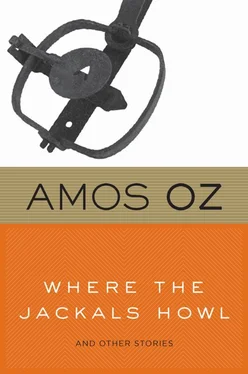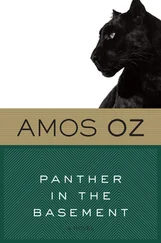Amos Oz - Where the Jackals Howl
Здесь есть возможность читать онлайн «Amos Oz - Where the Jackals Howl» весь текст электронной книги совершенно бесплатно (целиком полную версию без сокращений). В некоторых случаях можно слушать аудио, скачать через торрент в формате fb2 и присутствует краткое содержание. Год выпуска: 2012, Издательство: Houghton Mifflin Harcourt, Жанр: Современная проза, на английском языке. Описание произведения, (предисловие) а так же отзывы посетителей доступны на портале библиотеки ЛибКат.
- Название:Where the Jackals Howl
- Автор:
- Издательство:Houghton Mifflin Harcourt
- Жанр:
- Год:2012
- ISBN:нет данных
- Рейтинг книги:4 / 5. Голосов: 1
-
Избранное:Добавить в избранное
- Отзывы:
-
Ваша оценка:
- 80
- 1
- 2
- 3
- 4
- 5
Where the Jackals Howl: краткое содержание, описание и аннотация
Предлагаем к чтению аннотацию, описание, краткое содержание или предисловие (зависит от того, что написал сам автор книги «Where the Jackals Howl»). Если вы не нашли необходимую информацию о книге — напишите в комментариях, мы постараемся отыскать её.
Where the Jackals Howl — читать онлайн бесплатно полную книгу (весь текст) целиком
Ниже представлен текст книги, разбитый по страницам. Система сохранения места последней прочитанной страницы, позволяет с удобством читать онлайн бесплатно книгу «Where the Jackals Howl», без необходимости каждый раз заново искать на чём Вы остановились. Поставьте закладку, и сможете в любой момент перейти на страницу, на которой закончили чтение.
Интервал:
Закладка:
“What… Has something happened? Didn’t Dinah go to Tel Aviv, or…”
“She went like a good little girl, and she’ll come back like a good little girl. But not until later. Come on, Yair. You won’t need your coat. It isn’t cold outside. It’s pleasant outside. You’ll have to excuse us, Uri. How you’ve grown! Good night.”
In the yard, near the pepper tree, she spoke to Yair again: “Don’t look so puzzled. Nothing serious has happened.”
But Yair already knew that he had made a mistake. He should have brought his coat, in spite of what Lily had said. The evening was cold. And later it would be very cold. He could still excuse himself, go back, and fetch his coat. Lily herself was wearing a coat that was stylish, almost daring. But to go back to the house for a coat seemed to him somehow dishonorable, perhaps even cowardly. He put the thought aside and said:
“Yes. It’s really pleasant out here.”
Since she was in no hurry to reply, Yair had time to wonder if there really were acacia trees in Jerusalem, and if so, where, and if not, perhaps shita should be taken as a clue to the verb leshatot —“to jest.” Who knows, maybe the treasure’s hidden in one of the wadis to the west or the south of Rehavia. Pity about the program. Now I’ll never know the solution.
4
AFTER A brief moment of astonishment and confusion and a few indecisive speculations, Yosef Yarden made up his mind to go to Dr. Kleinberger’s house. If he found him at home he would go in, apologize for the lateness of the hour and the unexpected visit, and tell his friend about this strange incident. Who would have thought it? And just imagine the look she would have given me if I had been a few minutes late. And there I was, standing and waiting, ten o’clock already, two and a half minutes past. If something had happened to her, she would have phoned me. There’s no way of understanding or explaining this.
“And for the time being you have avoided a vulgar and possibly painful argument,” said Elhanan Kleinberger, smiling. “She wouldn’t have given in to you over the guest list. She’ll send invitations all over the city, all over the university. To the President of the State and the Mayor of Jerusalem. And really, Yosef, why should you expect her to give up what she wants in deference to what you want? Why shouldn’t she invite the Pope and his wife to the wedding of her only daughter? What’s the matter, Yosef?”
His guest began to explain, patiently:
“Times are not easy. In general, I mean. And remember, all these years we have been preaching, both in speech and in writing, the need to ‘walk humbly.’ Yair’s mother wanted an intimate wedding, a small circle of relatives, and that is a kind of imperative, at least from the ethical point of view. And… then there’s the cost. I mean, who wants to go into debt for the sake of a society wedding?”
Dr. Kleinberger felt that he had lost the thread. He made coffee, set out milk and sugar. And at this point he also took the opportunity to add something to his previous remarks concerning the interplay of opposite extremes. The conversation soon diversified. They discussed Egyptology, they discussed Hebrew literature, they conducted a scathing inquiry into the workings of the municipality of Jerusalem. Elhanan Kleinberger has a great flair for linking together Egyptology, his professional field, and Hebrew literature, which is his heart’s love, as he puts it, and of which he is a passionate lover, as he also puts it. In general, Yosef is used to having his views overruled by those of his friend, although he tends on most occasions to reject the particular wording adopted by Elhanan Kleinberger. So their arguments end with the last word going to Yosef Yarden and not to his old friend.
Were it not for the cold, the two friends would have gone out together to stand on the balcony and gaze at the starlight on the hills, as was their habit in summer. The Valley of the Cross lies opposite. There old olive trees grow in bitter tranquillity.
In passionate, almost violent hunger, the olive trees send out their tendrils into the blackness of the heavy earth. There the roots pierce the rocky subsoil, cleaving the hidden stones and sucking up the dark moisture. They are like sharpened claws. But above them the green and silver treetops are caressed by the wind: theirs is the peace and the glory.
And you cannot kill the olive. Olive trees burned in fire sprout and flourish again. A vulgar growth, quite shameless, Elhanan Kleinberger would say. Even olives struck by lightning are reborn and in time clothe themselves with new foliage. And they grow on the hills of Jerusalem, and on the modest heights on the fringes of the Coastal Plain, and they hide away in the cloisters of monasteries enclosed within walls of stone. There the olives thicken their knotted trunks generation after generation and lasciviously entwine their stout branches. They have a savage vitality like that of birds of prey.
To the north of Rehavia lie sprawling suburbs, poor neighborhoods with charming streets. In one of these winding alleyways stands an old olive tree. One hundred and seven years ago an iron gate was erected here and the lintel was supported by the tree. Over the years the tree leaned against the iron, and the iron bit deep into the trunk like a roasting spit.
Patiently the olive began to enfold the iron wedge. In the course of time it closed around it and set tight. The iron was crushed in the tree’s embrace. The tree’s wounds healed over, and the vigorous foliage of its upper branches was in no way impaired.
5
YAIR YARDEN is a young man of handsome appearance. He is not tall, but his shoulders are powerful and his torso is trim, well proportioned, and athletic. His chin is firm and angular, with a deep dimple. Girls secretly long to touch this dimple with their fingertips, and some of them even blush or turn pale when they feel the impulse. They say, “And what’s more, he thinks he knows a thing or two. He’s about as brainy as a tailor’s dummy.”
His arms are strong and covered in black hair. It would be wrong to say that Yair Yarden is clumsy, but there is a certain heaviness, a kind of slow solidity, perceptible in all his movements. Lily Dannenberg would have called this “massivity” and returned to her theme of the inadequacy of the Hebrew language, with its dearth of nuances. Of course, Elhanan Kleinberger is capable of refuting such barbed comments and of suggesting in the twinkling of an eye a suitable Hebrew adjective, or even two. And at the same time he will come up with a Hebrew expression to fit the word “nuance.”
It may be that this fascinating “massivity” with which Yair Yarden is endowed will change within a few years into the patriarchal corpulence for which his father is noted. A sharp eye may detect the first signs. But at present — Lily has no intention of disguising the truth — at present, Yair is a handsome, captivating youth. The mustache gives a special force to his appearance. It is blond, droopy, sometimes flecked with shreds of tobacco. Yair is studying economics and business management at the university; his whole future lies before him. Romantic follies, kibbutzim, and life in border settlements hold no attraction for him. His political views are temperate; he has learned them from his father. To be precise, Yosef Yarden sees in the political situation a wasteland of degeneracy and arrogance, whereas Yair sees a wide-open prospect before him.
“Will you offer me a cigarette, please,” said Lily.
“Of course. Here you are. Please take one, Lily.”
“Oh, thank you. I left mine at home, I was in such a hurry.”
“A light, Lily?”
“Thank you. Dinah Yarden — a name almost as musical as Dinah Dannenberg. Perhaps a little simpler. When you have a child you can call him Dan. Dan Yarden: like something out of a ballad about camels and bells. How much time are you going to give me, how long will it be, before you make me a grandmother? A year? A bit less? You needn’t answer. It was a rhetorical question. Yair, how do you say ‘rhetorical question’ in Hebrew?”
Читать дальшеИнтервал:
Закладка:
Похожие книги на «Where the Jackals Howl»
Представляем Вашему вниманию похожие книги на «Where the Jackals Howl» списком для выбора. Мы отобрали схожую по названию и смыслу литературу в надежде предоставить читателям больше вариантов отыскать новые, интересные, ещё непрочитанные произведения.
Обсуждение, отзывы о книге «Where the Jackals Howl» и просто собственные мнения читателей. Оставьте ваши комментарии, напишите, что Вы думаете о произведении, его смысле или главных героях. Укажите что конкретно понравилось, а что нет, и почему Вы так считаете.












